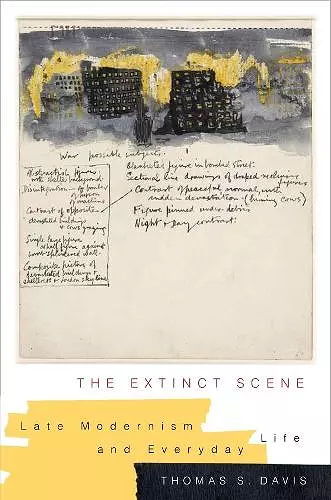The Extinct Scene
Late Modernism and Everyday Life
Format:Paperback
Publisher:Columbia University Press
Published:20th Dec '19
Should be back in stock very soon

In 1935, the English writer Stephen Spender wrote that the historical pressures of his era should "turn the reader's and writer's attention outwards from himself to the world." Combining historical, formalist, and archival approaches, Thomas S. Davis examines late modernism's decisive turn toward everyday life, locating in the heightened scrutiny of details, textures, and experiences an intimate attempt to conceptualize geopolitical disorder.
The Extinct Scene reads a range of mid-century texts, films, and phenomena that reflect the decline of the British Empire and seismic shifts in the global political order. Davis follows the rise of documentary film culture and the British Documentary Film Movement, especially the work of John Grierson, Humphrey Jennings, and Basil Wright. He then considers the influence of late modernist periodical culture on social attitudes and customs, and presents original analyses of novels by Virginia Woolf, Christopher Isherwood, and Colin MacInnes; the interwar travel narratives of W. H. Auden, Christopher Isherwood, and George Orwell; the wartime gothic fiction of Elizabeth Bowen; the poetry of H. D.; the sketches of Henry Moore; and the postimperial Anglophone Caribbean works of Vic Reid, Sam Selvon, and George Lamming. By considering this group of writers and artists, Davis recasts late modernism as an art of scale: by detailing the particulars of everyday life, these figures could better project large-scale geopolitical events and crises.
The Extinct Scene encourages us to see how British intellectuals, metropolitan and colonial, registered the impact of world-historical events—especially the Second World War and the collapse of the British Empire—through depictions of the everyday. With fresh readings of canonical writers and suggestive interpretations of less widely studied figures, this book offers a smart and timely contribution to the ongoing reevaluation of midcentury modernism. -- Peter Kalliney, University of Kentucky
The Extinct Scene is a superb conceptual and historical contribution to twentieth-century literary studies, treating the period of geopolitical crisis between World War I and World War II. Thomas S. Davis rethinks the legacies of avant-gardism and modernism in Britain in the wake of World War I, tracing an 'outward turn' that enfolds modernist techniques into realist forms. With astute readings of texts and films that focus on everyday scenes and objects—amid bombed landscapes and under the specter of another war—Davis also considers how these aesthetics reflect authors' investments in state-rebuilding projects or in nationalist sentiment. Drawing deftly on critical theory, The Extinct Scene also develops an exemplary method for interpreting literature and authorship in its geopolitical context. -- Laura Doyle, University of Massachusetts
The Extinct Scene opens up a new trove of modernist genres that gave literary form to the world-systemic transitions of the mid-twentieth century. Davis's insistence on the geopolitical rather than the global as the frame of reference for experimental writing makes this book more conceptually rigorous and politically current than other works in transnational modernisms. An entirely convincing account of the period, as deft in its fine-grained readings as it is inspiring in its theoretical ambition. -- Jed Esty, author of Unseasonable Youth: Modernism, Colonialism, and the Fiction of Development
[An] impressive study.... [Davis] provides fresh insights into a period already intensely studied, offering new and wide-ranging interpretations.... Recommended. * Choice *
A brilliant and timely book.... [The Extinct Scene] combines theoretical sophistication with historical detail to produce finely grained readings. -- Allan Hepburn * Modernism / modernity *
[A] brilliant book.... Davis brings a new level of archival density and diversity – from Mass-Observation to the Windrush generation – to bear on conversations about Modernism and the way we relate global events to the developing variety and social agility of aesthetic form throughout this convulsive era. -- David James * Times Literary Supplement *
A valuable contribution to the growing scholarship on late modernism, to which it adds a compelling interpretive frame. . . . its theoretical reflections on 'everyday life' will benefit those seeking to develop a better understanding of how art mediates larger world-historical forces. -- Matthew Eatough * Modern Language Quarterly *
There's a lot to admire in this wide-ranging study, which will certainly sharpen scholars' understanding of the ways late modernism rings the changes on what are arguably key themes for modernism tout court: the quotidian and the global. -- Len Gutkin * MFS: Modern Fiction Studies *
A new and noteworthy account of the complicated aesthetic networks of interwar Britain. * Novel: A Forum on Fiction *
ISBN: 9780231169431
Dimensions: unknown
Weight: unknown
328 pages